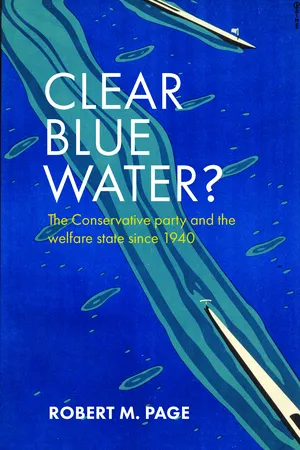
Clear Blue Water?
The Conservative Party and the Welfare State since 1940
- 212 pages
- English
- ePUB (mobile friendly)
- Available on iOS & Android
Clear Blue Water?
The Conservative Party and the Welfare State since 1940
About this book
Has the modern Conservative Party developed a distinctive approach to the post-war welfare state? In exploring this question, this accessible book takes an authoritative look at Conservative Party policy and practice in the modern era. The book takes as its main starting point the progressive One Nation Conservative (1950-64) perspective, which endeavoured to embrace those features of the welfare state deemed compatible with the party's underlying 'philosophy'. Attention then shifts to the neo-liberal Conservatives (1974-97), who sought to reverse the forward march of the welfare state on the grounds of its 'harmful' economic and social effects. Finally, David Cameron's (2005-present day) 'progressive' neo-liberal Conservative welfare state strategy is put under the spotlight. The book's time-defined content and broad historical thread make it a valuable resource for academics and students in social policy and politics as well as social history.
Frequently asked questions
- Essential is ideal for learners and professionals who enjoy exploring a wide range of subjects. Access the Essential Library with 800,000+ trusted titles and best-sellers across business, personal growth, and the humanities. Includes unlimited reading time and Standard Read Aloud voice.
- Complete: Perfect for advanced learners and researchers needing full, unrestricted access. Unlock 1.4M+ books across hundreds of subjects, including academic and specialized titles. The Complete Plan also includes advanced features like Premium Read Aloud and Research Assistant.
Please note we cannot support devices running on iOS 13 and Android 7 or earlier. Learn more about using the app.
Information
Notes
Table of contents
- Cover
- Title Page
- Copyright
- Dedication
- Contents
- About the author
- Acknowledgements
- Preface
- One: Conservatism, the 'modern' Conservative Party and the welfare state
- Two: From war to peace: the Conservatives and the welfare state in the 1940s
- Three: Towards a One Nation Conservative welfare state? The Conservatives and the welfare state, 1950-64
- Four: The Heath 'interregnum': modern technocratic Conservatism and the welfare state, 1965-74
- Five: The Conservative (counter-)revolution: neo-liberal Conservatism and the welfare state, 1974-97
- Six: Progressive neo-liberal Conservatism and the welfare state, 2005-15
- Epilogue: The Conservative Party and the welfare state: clear blue water?
- Postscript
- Appendix: Selected ministerial posts in Conservative or Conservative-led governments, 1940-2015
- Notes
- References